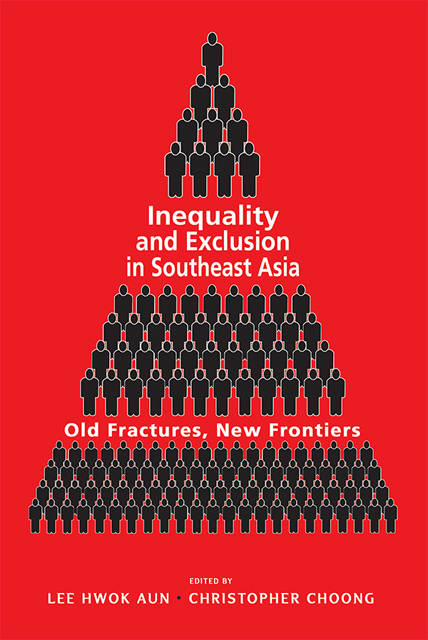Book contents
- Frontmatter
- Contents
- List of Tables
- List of Figures
- Acknowledgements
- About the Contributors
- 1 Introduction: Inequality and Exclusion in Southeast Asia
- 2 Cambodia’s Experiences in Addressing Inequality
- 3 Inequality and Exclusion in Post-Soeharto Indonesia
- 4 Inequality and Exclusion in Malaysia: Macro Trends, Labour Market Dynamics and Gender Dimensions
- 5 Inequality in Myanmar: Structural Change, Policy Outcomes and Gender Dimensions
- 6 Structural Inequality in the Philippines: Oligarchy, Economic Transformation and Current Challenges to Development
- 7 Inequality and the Social Compact in Singapore: Macro Trends vs Lived Inequalities
- 8 Inequality in Thailand: Income, Socio-economic and Wealth Dimensions
- 9 Trends and Drivers of Inequality in Vietnam
- 10 Conclusion: Old Fractures and New Frontiers
- Index
1 - Introduction: Inequality and Exclusion in Southeast Asia
Published online by Cambridge University Press: 01 September 2023
- Frontmatter
- Contents
- List of Tables
- List of Figures
- Acknowledgements
- About the Contributors
- 1 Introduction: Inequality and Exclusion in Southeast Asia
- 2 Cambodia’s Experiences in Addressing Inequality
- 3 Inequality and Exclusion in Post-Soeharto Indonesia
- 4 Inequality and Exclusion in Malaysia: Macro Trends, Labour Market Dynamics and Gender Dimensions
- 5 Inequality in Myanmar: Structural Change, Policy Outcomes and Gender Dimensions
- 6 Structural Inequality in the Philippines: Oligarchy, Economic Transformation and Current Challenges to Development
- 7 Inequality and the Social Compact in Singapore: Macro Trends vs Lived Inequalities
- 8 Inequality in Thailand: Income, Socio-economic and Wealth Dimensions
- 9 Trends and Drivers of Inequality in Vietnam
- 10 Conclusion: Old Fractures and New Frontiers
- Index
Summary
A PRESSING AND DEFINING ISSUE
Inequality and exclusion are defining problems of our times globally, regionally, nationally. In introducing this book’s impetus and formation, it is helpful to passage through these geographic and academic layers. Inequalities of opportunity, well-being, income and wealth have existed in all societies, but the past decade has seen heightened perceptions that globalized capitalist systems enrich the few at the expense of the many. Tellingly, the Millennium Development Goals 2015 specified gender equality while generally focusing on poverty and basic needs, while the Sustainable Development Goals 2030 inscribed reduction of inequality within and among countries as one of the various new goals pursuing equitable distribution of socio-economic benefits.
Alongside burgeoning prosperity, uncertainty and precarity are also growing, fuelling public sentiments and popular discourses surrounding these phenomena. Social discontent arises from local, lived experiences. Social movements, voters and the general public around the world are signalling for more policies that foster equitable outcomes and bolster incomes at the bottom and middle of the distribution, and that protect the vulnerable and disadvantaged. The COVID-19 pandemic and its economic aftermath have further revealed the ways that existing inequalities can be compounded in crisis times.
The focus has decidedly fallen on disparities within countries. Inequality between countries remains salient; national income persists at low levels in many countries. Nonetheless, inequality is acknowledged as a problem all countries need to address; even if poverty alleviation takes relative precedence, rich-poor disparities and structural exclusion can undermine sustainable growth. Empirical evidence, based on increasingly widespread household income surveys, also find that within-country inequality accounts for the bulk of global household income inequality (Milanovic 2016; Bourguignon 2017). Widening inequality has been recognized as a precursor to the global financial crisis, especially in advanced economies that from the 1990s reversed the inequality reduction achieved from the 1950s through to the 1980s (Piketty 2014; Milanovic 2016; Christiansen and Jensen 2019). The general public also views the problem with increasing gravity. The World Values Survey, which has repeated the inquiry in a consistent sample of countries representing 40 per cent of the world’s population, reports a rising share in the past decade that regard inequality as a significant problem warranting policy attention (UNDP 2019).
- Type
- Chapter
- Information
- Inequality and Exclusion in Southeast AsiaOld Fractures, New Frontiers, pp. 1 - 21Publisher: ISEAS–Yusof Ishak InstituteFirst published in: 2023

